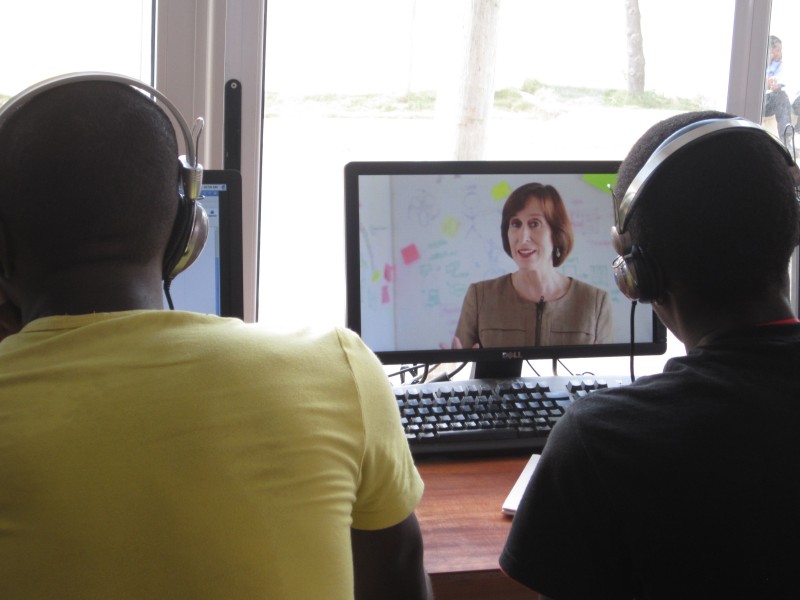Studying at Stanford no longer requires maintaining a near-perfect GPA while captaining three sports teams, running the high school newspaper, volunteering with a child literacy program, mastering the cello, serving as student council president, finding a solution to world hunger, and $225,000.
NovoEd launched today to make access to courses from prestigious educational institutions available to anyone, starting with Stanford.
[aditude-amp id="flyingcarpet" targeting='{"env":"staging","page_type":"article","post_id":716322,"post_type":"story","post_chan":"none","tags":null,"ai":false,"category":"none","all_categories":"business,entrepreneur,","session":"A"}']The company started out as Venture Lab, a project run by a Stanford professor and a PhD student to make online learning more social, experiential, and interactive. Many Stanford professors were interested in taking their courses online but said presenting material in that format did not allow for the degree of interactivity they desired. Using a combination of techniques in crowdsourcing, design and analysis of reputation systems, and algorithm design, NovoEd’s platform enables collaboration and peer learning. The classes are built around team-based exercises that require students to exchange ideas, communicate, and evaluate each others’ work.
“The platform is designed to map more closely how the world really works,” CEO Amin Saberi said in a Q&A. “It promotes higher engagement and accountability among students through several social processes designed to give them a meaningful sense of activity and membership in a learning community. Together, they create a force that maintains students’ attention, interest, and engagement throughout the course.”
AI Weekly
The must-read newsletter for AI and Big Data industry written by Khari Johnson, Kyle Wiggers, and Seth Colaner.
Included with VentureBeat Insider and VentureBeat VIP memberships.
Saberi is an associate professor of management science and engineering. He founded Venture Lab with PhD student Farnaz Ronaghi, whose thesis focuses on creating social incentives in online learning. The first class offered through Venture Lab was titled ‘Technology Entrepreneurship’ and attracted more than 80,000 students from over 150 countries. They formed teams to execute the assigned projects, which required them to use skills in problem solving, communication, and leadership. The top 200 teams found mentors to help them develop business plans, and the top 20 teams pitched their ideas to venture capitalists. The course ultimately led to the creation of multiple companies around the world, and Saberi said a few have even received funding.
The success of Venture Lab encouraged Saberi and Ronaghi to take a leave of absence from Stanford to pursue NovoEd full-time. Starting today, Stanford University will use the platform to offer seven courses to the general public, as well as 10 private courses available only to current Stanford students. Course topics are diverse and include ‘A crash course on creativity,” “Mobile health without borders,” and “Finance.”
Online education portals like Coursera, Udacity, and Khan Academy have disrupted the world of education by making classes available to anyone with an Internet connection and the desire to learn. These Massive Online Open Courses (MOOCs) lower the barriers to entry and the costs for students that want to boost their resume, develop a new skill, or nurture a side interest. However, one of the disadvantages of online education is isolation — students are not learning in a classroom environment where they can come together to challenge each other, problem solve, and exchange ideas. Saberi said the ability to work with others, cultivate leadership skills, hone communication abilities, and negotiate one’s role in a team are just as important as the content itself.
“I keep telling my students that if you graduate at the age of about 25, you can expect at least four decades in the workforce and the world is going to change four or five times in that time,” he said. “Because of this, you should not think that you can just rely on the materials that you learn today. It is more important to learn how to address and solve novel and complex problems and to collaborate and communicate effectively to implement the solutions. We need more creative thinkers, leaders, and team players.”
To achieve this goal, NovoEd has raised seed funding of an undisclosed amount from Costanoa Ventures, Foundation Capital, Kapor Capital, Learn Capital, Maveron, Ulu Ventures, and a number of angels. The startup has seven employees and is based in Menlo Park, Calif.
Photo Credit: NovoEd
[aditude-amp id="medium1" targeting='{"env":"staging","page_type":"article","post_id":716322,"post_type":"story","post_chan":"none","tags":null,"ai":false,"category":"none","all_categories":"business,entrepreneur,","session":"A"}']
VentureBeat's mission is to be a digital town square for technical decision-makers to gain knowledge about transformative enterprise technology and transact. Learn More

